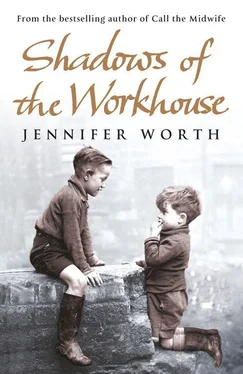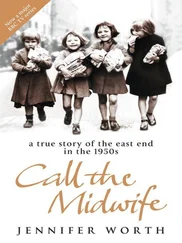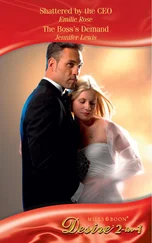Jennifer Worth - Shadows Of The Workhouse - The Drama Of Life In Postwar London
Здесь есть возможность читать онлайн «Jennifer Worth - Shadows Of The Workhouse - The Drama Of Life In Postwar London» весь текст электронной книги совершенно бесплатно (целиком полную версию без сокращений). В некоторых случаях можно слушать аудио, скачать через торрент в формате fb2 и присутствует краткое содержание. Жанр: Биографии и Мемуары, на английском языке. Описание произведения, (предисловие) а так же отзывы посетителей доступны на портале библиотеки ЛибКат.
- Название:Shadows Of The Workhouse: The Drama Of Life In Postwar London
- Автор:
- Жанр:
- Год:неизвестен
- ISBN:нет данных
- Рейтинг книги:5 / 5. Голосов: 1
-
Избранное:Добавить в избранное
- Отзывы:
-
Ваша оценка:
- 100
- 1
- 2
- 3
- 4
- 5
Shadows Of The Workhouse: The Drama Of Life In Postwar London: краткое содержание, описание и аннотация
Предлагаем к чтению аннотацию, описание, краткое содержание или предисловие (зависит от того, что написал сам автор книги «Shadows Of The Workhouse: The Drama Of Life In Postwar London»). Если вы не нашли необходимую информацию о книге — напишите в комментариях, мы постараемся отыскать её.
Shadows Of The Workhouse: The Drama Of Life In Postwar London — читать онлайн бесплатно полную книгу (весь текст) целиком
Ниже представлен текст книги, разбитый по страницам. Система сохранения места последней прочитанной страницы, позволяет с удобством читать онлайн бесплатно книгу «Shadows Of The Workhouse: The Drama Of Life In Postwar London», без необходимости каждый раз заново искать на чём Вы остановились. Поставьте закладку, и сможете в любой момент перейти на страницу, на которой закончили чтение.
Интервал:
Закладка:
“We sailed from Plymouth. There were crowds on the quayside, cheering, waving, singing. Some of the lads were happy and excited at going, but my heart was heavy, and a lot of others felt the same. I reckon that single men make the best soldiers, because they have few regrets about what they leave behind.”
He went on to describe the troopship, crowded with men and horses, carts and wagons, guns and munitions, food and supplies. The journey took five weeks. Discipline had to be very strict, because of living in such a close, crowded space. The men did hours of drill on deck. But they were in good spirits, because it all seemed like an adventure. “We were going to knock hell out of those Boer farmers who dared to defy the British Empire,” he said.
They landed at Durban and were ordered to form ranks and march. They weren’t told where they were going, just told to march. They marched for eight days in full winter uniform in the boiling heat, carrying 150 lb packs. The sun burned down relentlessly, and flies and mosquitoes followed them all the way. There were no roads, so they marched through open scrubland, and along rough tracks. The countryside was beautiful, and wild, nothing like home, but they were too tired and too hot to take it in.
“I was in a Highland Regiment, as you know – the Scots Guards – and I’ll tell you something: there is nothing in the world like the sound of the bagpipes to raise a man’s morale, to lift his spirits, and give him strength. However tired and thirsty we were, the bagpipes at the front of the column only had to strike up and within seconds you felt your feet lift off the ground, your step lighten, your spirits rise, and every man-Jack was marching strong, in rhythm to the pipes.” Mr Collett chuckled, straightened his shoulders, threw back his head, and swung his arms as though he were marching.
“There’s a photograph of my regiment hanging on the wall over there, if you’d like to have a look.”
I peered at the grey-and-yellow photo of a column of soldiers, which didn’t really mean a lot to me, but I said it looked impressive.
“Yes, it was impressive, you’re right. But, at the same time, it was insane.”
I was surprised to hear him say that.
“Well, you imagine: going to war, and marching through open country, soldiers in scarlet, playing bagpipes! Talk about secrecy or surprise tactics! The enemy could see and hear us for God knows how many miles around. And we never saw them. All over South Africa columns like ours were marching, and being attacked by an unseen enemy. Yet the British generals still didn’t learn. We carried on in our old swaggering ways, and lost countless thousands of young men because of it.”
He told me they were ordered to climb a hill one night. He didn’t know where, because none of them were told, but it was steep and treacherous, more like mountain terrain than a hill. They had no special climbing equipment. They wore their military uniforms with full pack, as well as rifle and bayonet, and were wearing boots made for marching, not for climbing. Nor were the men trained for mountaineering.
By dawn they had got to what they thought was the top, only to find that there were higher ridges all around that were invisible from below, and in which groups of armed men were hiding. When the whole brigade had gained the first ridge, fire opened up from all sides, from cannons, rifles and long-range muskets. They were completely unprepared. Hundreds of men were mown down before they could retaliate.
“I shall never forget the scene,” said Mr Collett. “The cries and screams were terrible to hear. We formed ranks and fired back, but our position was hopeless. We were in full view of an enemy we could not see. It was a day of gunfire, under a baking sun. No shelter, no water. Just relentless gunfire.”
By nightfall the barrage from the guns died away, and in the darkness all that could be heard were the cries and groans of the wounded. “We tried to help them, but we were stumbling over rocks and dead bodies. In any case, there were no doctors or medical orderlies, no bandages or morphine, no stretchers – nothing.” The men were ordered to retreat, and to leave the dead. In the sun the injured would die of thirst the following day. “That was the moment when I realised the truth of my mother’s words, that we were just ‘cannon-fodder’. Young private soldiers were ordered, time and time again, to march directly into gunfire, and High Command didn’t give a damn how many died, nor the cost in human suffering.” Mr Collett was trembling and his voice was shaky.
He bit his lip to control himself.
“And would you believe it, it was all unnecessary. Of course, we didn’t know it at the time – the ordinary soldier didn’t – but there had been no reconnaissance. There were no maps of the terrain, and no scouts had been sent ahead to assess the area or the heights of the various hills. If we’d had a ground map, the whole incident would never have happened. The British lost two thousand men that day, the Boers two hundred – all because there was no reconnaissance.
“I’ve read a lot of history in my life, and bad leadership seems to crop up time after time in the British Army. Of course, we had some good colonels, and generals as well, but it was always a lottery.”
Mr Collett spoke with some bitterness about the effect in those days of the class system when, as he put it, only the aristocracy and upper classes could hold a commission, and they bought their rank. Working-class men could not afford to buy a commission. This meant that a young man with money, however stupid he might be, however lazy, or indifferent to army life, could buy a rank and be put in charge of other men. The tradition of an easy life for the officers, with nothing but parties and races, was well entrenched, and any friendship between officers and other ranks was forbidden. “They did not think of us as human beings,” said Mr Collett. “We meant nothing to them. We were just ‘the scum of the earth’, utterly disposable.
“I don’t know how it was that I wasn’t killed. In my regiment, more than three-quarters of the men who went out to South Africa died, either in battle or in the military hospitals. Yet somehow I was spared.”
Another killer was disease. Mr Collett had suffered slight leg wounds in one skirmish, and had a short stay in hospital. While he was there he saw a constant stream of men being brought in with what was called dysentery. It was, in fact, typhoid fever, due to infected water, and it spread like wildfire. At one stage it seemed to be out of control. He commented: “I don’t know if anyone who caught the disease recovered, but I know that I never saw a man walk out. I only saw the bodies carried out – ten or twenty a day from one ward – and they were quickly replaced by as many new patients with the same disease. The small hospital that I was in had been built for three hundred patients, and it was carrying two thousand. There were nowhere near enough doctors or nurses to treat all those men, so most of them died. Three times as many men died in the hospitals as died on the battlefields. I don’t know how it was that I didn’t catch typhoid. I was spared for something worse.”
I wondered what could be worse, and imagined the heartache and frustration of trying to nurse sick and dying men under such impossible conditions.
“Somehow I survived and had to take part in what was called ‘the bitter end’. After two and a half years of fighting we were no closer to victory than we had been at the beginning. We couldn’t engage the enemy. They were always hiding and attacking our lines, our communications, our stores, always surprising us. So our generals decided to attack their food supplies. This meant attacking their farms. A ‘scorched-earth’ policy was approved and we private soldiers had to carry it out. We hated it. Most of us felt degraded and emasculated, attacking women and children. We turned them out of their homes and burned their farms and barns. We killed their animals and burned their fields. Nothing was left after we’d finished. They were turned out to wander the veldt with no water, no food, prey to wild animals. I remember one young Boer woman with two little children and a baby. She was sobbing, begging us to spare her. I wanted to, but refusal to obey military orders is unthinkable. It would have meant execution by firing squad if I had done so. Perhaps I would have risked it if I had been single. But my money was going to Sally and the boys, and to my mother for the rent. What could I do? And even if I had disobeyed orders, it would have done no good. Other men would have carried out the job.” He looked very grim and bitter.
Читать дальшеИнтервал:
Закладка:
Похожие книги на «Shadows Of The Workhouse: The Drama Of Life In Postwar London»
Представляем Вашему вниманию похожие книги на «Shadows Of The Workhouse: The Drama Of Life In Postwar London» списком для выбора. Мы отобрали схожую по названию и смыслу литературу в надежде предоставить читателям больше вариантов отыскать новые, интересные, ещё непрочитанные произведения.
Обсуждение, отзывы о книге «Shadows Of The Workhouse: The Drama Of Life In Postwar London» и просто собственные мнения читателей. Оставьте ваши комментарии, напишите, что Вы думаете о произведении, его смысле или главных героях. Укажите что конкретно понравилось, а что нет, и почему Вы так считаете.






![Theresa Cheung - The Dream Dictionary from A to Z [Revised edition] - The Ultimate A–Z to Interpret the Secrets of Your Dreams](/books/692092/theresa-cheung-the-dream-dictionary-from-a-to-z-r-thumb.webp)





